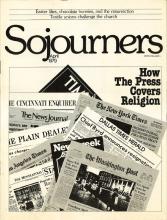I was the first one awake in my household last Easter morning. With resurrection enthusiasm, I had decided to fix breakfast for the rest of the family. It was cold in our basement kitchen. The rain was pouring down outside. Through a grated window, I watched a rat scuttle through some garbage in the alley. My spirits, like the garbage outside, were dampened. It was not my idea of a joyous Easter morning. I remembered other Easters, all the same. Hershey, Pennsylvania. Most of the town, including my family, gathered each Easter in pre-dawn twilight in the town's large rose garden. A chorus of brass instruments welcomed the sun as it peeked above the horizon, casting a path of orange brilliance across the garden's pond and bringing to full hue its acres of flowers. We sang hymns, smiled, and commented each year how beautiful it was. Back at home we stuffed ourselves on our hometown's candy (proud, as citizens of "Chocolatetown, USA," to be conspirators in the perpetuation of Easter joy and myths about large rabbits).
Ann was my best friend then. I saw her again, after several years, about a week after last Easter. As a nurse, she spent Easter eve with a young girl who had been in a coma for three days, believed to be dying. Ann prayed and stayed by her side and comforted the family through the night. At about four o'clock Easter morning the girl awoke. It was a joyful awakening that brought a flood of tears from everyone at the bedside, a special sort of resurrection.
As Ann related the story to me with emotion she concluded, "I learned this year that Easter isn't a sunrise in the Hershey Rose Garden."
What we were both beginning to understand was the deep connection between pain and joy, and the failure of our past to make that connection, or even mention it.
Read the Full Article

